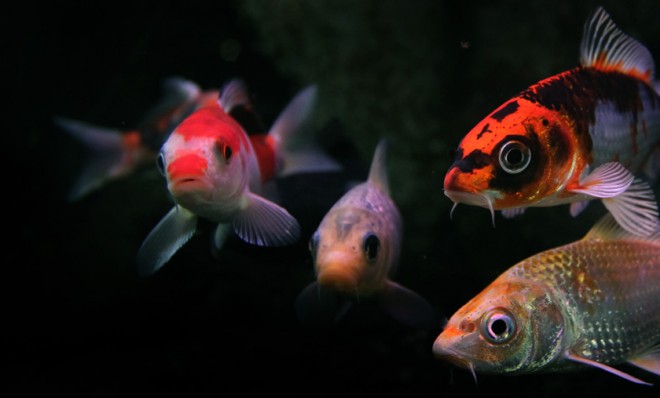Virginia's great koi heist actually isn't that unusual
Two men brazenly stole 400 koi from a Virginia office park. They are hardly the first to target these ornamental fish


A free daily email with the biggest news stories of the day – and the best features from TheWeek.com
You are now subscribed
Your newsletter sign-up was successful
Between June 8 and June 16, two men stole about 400 koi from the pond at an office park in Herndon, Va., outside of Washington, D.C. They pulled off the heist in broad daylight, under the gaze of security guards and office workers who enjoyed watching the ornamental carp swim around during their lunch breaks.
"The great koi heist began with the thieves handing out a business card," says Justin Jouvenal in The Washington Post. The two men, described as 50-something Caucasians wearing khaki pants and white shirts, said they were from a fish-care company, there to check on the health of the koi and cart away the unhealthy ones.
"The criminals' ruse was so well orchestrated," says Jouvenal, "that no one realized 400 koi had been carefully packed in large coolers and stolen until after the men were gone and security mentioned the crew to the property-management company." The reaction from the office management and police was the same: "Who steals these kind of fish?"
The Week
Escape your echo chamber. Get the facts behind the news, plus analysis from multiple perspectives.

Sign up for The Week's Free Newsletters
From our morning news briefing to a weekly Good News Newsletter, get the best of The Week delivered directly to your inbox.
From our morning news briefing to a weekly Good News Newsletter, get the best of The Week delivered directly to your inbox.
Lots of people, it turns out. And the reason is fairly obvious: Money. Even low-end koi, like you might buy at PetSmart, cost about $6 each, fish vendor Steve Koza tells WTOP radio. His store, Tropic Bay Water Gardens in Davidsonville, Md., sells koi for $30 apiece, on average, but larger specimens can fetch hundreds or even thousands of dollars. The Herndon office-park pond has held koi for 25 years, so there were undoubtedly some large fish in the pond — koi can live up to 47 years.
The total Herndon haul is worth at least $20,000, says Philip Gray, president of the Mid-Atlantic Koi Club. But "the strange case has opened a window on the little-known and arcane world of koi collectors," says The Washington Post's Jouvenal. Collectors "will pay as much as $25,000 for a championship fish and passionately pit their prized specimens against each other at competitions."
It's not just eccentric koi collectors, either. Ornamental carp have been around since at least 470 BC, and Japan has developed its koi culture since 714 AD, but "with an increased use of water features and oriental themes on landscaping, koi have gained popularity in American gardens," too, says the Missouri Botanical Garden, which lists koi as one of its most popular attractions. And there is a sort of poetry to the fish:
Over centuries, the Japanese have bred koi to display brilliant colors in varied patterns. For example, a specimen with a blue back and red belly might be described as "autumn sky over red maples." There are varieties with a highly metallic sheen, as well as the aptly named mirror (or German) carp which have a few very large iridescent scales. These robust fish have come to symbolize courage, strength, and masculinity. [Missouri Botanical Garden]
And, for some thieves, cash. Jouvenal points to a handful of recent koi heists, including the theft of eight koi from the University of Wisconsin in Madison, in May (value: $1,600), the pilfering of nine koi from a Florida woman in January, and a 2010 raid of 25 koi from a family's pond in Scarsdale, N.Y. "I think the real number of koi theft is much higher than reports will tell us," says Tiebo Jacobs at the Dutch site KoiQuestion. Owners often blame a large bird or a cat for stealing their koi, Jacobs says, "while in fact some other human has put his claws at work."
A free daily email with the biggest news stories of the day – and the best features from TheWeek.com
Koi thieves have to be discrete when it comes time to resell their haul, says Dutch koi specialist Bennie Wiegman: "Koi have very unique features and patterning and will be recognized for sure. Therefore, it is most likely that either the koi are stolen by pond owners who do not have the financial means to buy these rather expensive fish or koi are specifically ordered, probably from abroad."
The bottom line, Wiegman tells the Netherlands' Dagblad van het Noorden, is that your expensive koi are not safe. "In Germany, people even talk about the koi mafia," he says. "People who have expensive koi, nowadays they always buy a security system — cameras, motion detectors, that sort of thing."
A Washington Post reader has one more idea:
All that for a fish you can't even eat.
Peter has worked as a news and culture writer and editor at The Week since the site's launch in 2008. He covers politics, world affairs, religion and cultural currents. His journalism career began as a copy editor at a financial newswire and has included editorial positions at The New York Times Magazine, Facts on File, and Oregon State University.
-
 The UK expands its Hong Kong visa scheme
The UK expands its Hong Kong visa schemeThe Explainer Around 26,000 additional arrivals expected in the UK as government widens eligibility in response to crackdown on rights in former colony
-
 One great cookbook: Joshua McFadden’s ‘Six Seasons of Pasta’
One great cookbook: Joshua McFadden’s ‘Six Seasons of Pasta’the week recommends The pasta you know and love. But ever so much better.
-
 Scientists are worried about amoebas
Scientists are worried about amoebasUnder the radar Small and very mighty
